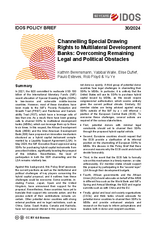Policy Brief
Channelling special drawing rights to multilateral development banks: overcoming remaining legal and political obstacles
Berensmann, Kathrin / Yabibal Walle / Elise Dufief / Paulo Esteves / Rob Floyd / Yu YePolicy Brief (30/2024)
Bonn: German Institute of Development and Sustainability (IDOS)
DOI: https://doi.org/10.23661/ipb30.2024
In 2021, the G20 committed to reallocate USD 100 billion of the International Monetary Fund’s (IMF) recent allocation of Special Drawing Rights (SDRs) to low-income and vulnerable middle-income countries. However, most of these donations have been made to the IMF’s Poverty Reduction and Growth Trust (PRGT) and Resilience and Sustain-ability Trust (RST), which have a leverage ratio of less than one. As a result, there have been growing calls to channel SDRs to multilateral development banks (MDBs), which can leverage them up to three to six times. In this respect, the African Development Bank (AfDB) and the Inter-American Development Bank (IDB) have proposed an innovative mechanism structured as a hybrid capital instrument comple-mented by a Liquidity Support Agreement (LSA). In May 2024, the IMF Executive Board approved using SDRs for purchasing hybrid capital instruments from prescribed holders, significantly boosting the prospect of this initiative. Nevertheless, the level of participation in both the SDR channelling and the LSA remains relatively low.
Against this background, this Policy Brief assesses the current positions as well as the institutional and political challenges of key players concerning the hybrid capital proposal, and it outlines how these challenges could be overcome. Some countries, in-cluding France, Japan, Spain and the United Kingdom, have announced their support for the proposal. Nevertheless, these countries have yet to translate their support into concrete action, and the precise extent of their contributions remains un-certain. Other potential donor countries with strong external positions and no legal restrictions, such as China, Qatar, Saudi Arabia, Canada and Australia, have not expressed interest in this proposal or have not done so openly. A third group of potential donor countries face legal challenges in channelling their SDRs to MDBs. In particular, it is unlikely that the United States will use its SDRs to purchase hybrid capital issued by MDBs, as this would require congressional authorisation, which seems unlikely given the current political climate. Similarly, EU member states are being advised against using SDRs outside of the IMF by a – still informal – position of the European Central Bank (ECB). To overcome these challenges, several actions are required of the various stakeholders.
• First, potential donors with minimal legal constraints should act to channel their SDRs through the proposed hybrid capital vehicle.
• Second, Eurozone countries should request that the ECB provide a clarification of its informal position on the channelling of European SDRs to MDBs. We discuss in this Policy Brief that there are sound reasons why the ECB could and should decide favourably.
• Third, in the event that the ECB fails to formally rule on this mechanism in a timely manner, or rules unfavourably, EU member states should support this proposal by participating in the “second layer” LSA through their development budgets.
• Fourth, African governments and the African Union (AU) should advocate on behalf of the AfDB in different fora such as the World Bank and IMF’s Spring and Annual Meetings, the G20 and regular summits such as with China and the EU.
• Finally, global and local civil society organisations (CSOs) and think tanks should advocate for potential donor countries to channel their SDRs to MDBs and provide enhanced analysis and research on the topic to inform policymakers and leaders both in donor and recipient countries.
Kontakt
Cornelia Hornschild
Koordinatorin Publikationen
E-Mail Cornelia.Hornschild@idos-research.de
Telefon +49 (0)228 94927-135
Fax +49 (0)228 94927-130
Alexandra Fante
Bibliothekarin/Open Access-Koordinatorin
E-Mail Alexandra.Fante@idos-research.de
Telefon +49 (0)228 94927-321
Fax +49 (0)228 94927-130





